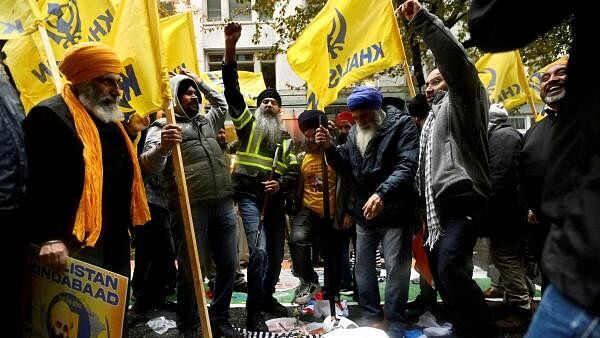
ikh protesters picket outside the Consulate General of India.
Credit: Reuters Photo
New Delhi: India has decided to cancel some of the consular camps it had planned to hold in Canada as the authorities in the North American country turned down requests to provide adequate security in spite of the recent attack carried out by the Khalistani Sikh extremists during such an event at a temple run by the Hindu Sabha.
“We had asked for security to be provided for our diplomats where the consular camp was to be held and those have not been provided by the Canadian side,” Randhir Jaiswal, the spokesperson of the Ministry of External Affairs (MEA), said on Thursday.
New Delhi’s missions in Ottawa, Toronto and Vancouver hold consular camps to provide certain documents, including life certificates, to people, particularly the pensioners, who migrated from India and accepted the citizenship of Canada.
“In view of the security agencies conveying their inability to provide minimum security protection to the community camp organisers, the consulate has decided to cancel some of the scheduled consular camps," the Consulate General of India in Toronto said in a post on X – just days after the November 3 attacks by the Khalistani Sikh extremists on the devotees as well as the Indian Canadian citizens, who had come to the consular camp organised at the Hindu Sabha Mandir to get the necessary documents issued.
Prime Minister Narendra Modi, himself, led the Government of India to condemn the “deliberate attack” and to ask the Government of Canada led by his counterpart Justin Trudeau to uphold the rule of law.
The Khalistani Sikh activists also protested against a camp held at a gurdwara in South Vancouver. A clash between the devotees and the extremists also led to the arrest of some people from near the Laxmi Narayan Temple at Surrey in the British Columbia province of the North American country.
New Delhi has been alleging that Trudeau and his government in Ottawa ignored its repeated requests to crack down on the Khalistani Sikh extremists running a campaign in Canada for the secession of India.
Though some of the consular camps to be held by New Delhi’s mission in Toronto have been cancelled, similar initiatives will continue in Vancouver and other places in Canada.
“We have a large diaspora in Canada. Many of these people, especially around the month of November, December, they need several documentations for continuation of their pensions and several other activities here in India. So, these consular camps that we do are helpful to the community, to both people of Indian nationality and people who are of Indian origin but Canadian nationals today,” Jaiswal said in New Delhi.
“These consular camps are conducted at the request of the community organizations. So, where the community organization is comfortable, we will go ahead with these consular camps,” added the MEA spokesperson.
The series of incidents of protests by the Khalistani Sikh extremists and attacks on the devotees of the Hindu Sabha Mandir and consular officials of the Government of India in Canada took place even as the relations between New Delhi and Ottawa hit a new low last year. The Trudeau Government recently accused New Delhi’s envoy to Ottawa, Sanjay Kumar Verma, and his five colleagues of having a role in the June 18, 2023, killing of Khalistani Sikh extremist Hardeep Singh Nijjar, who had managed to secure citizenship in Canada despite being one of the most wanted fugitive terrorists of India. New Delhi withdrew Verma and its other diplomats in the North American country after denying Ottawa’s request for waiving their diplomatic immunity and making them available for questioning by the police investigators in connection with the murder of Nijjar.
India also retaliated by expelling six diplomats of Canada.
“Over the last year or even more, the kind of things that we have seen attacking Indian diplomats, threatening, intimidating, harassing Indian diplomats...Yes, the threats have increased. Indian diplomats are being put under surveillance, which is totally unacceptable,” Jaiswal told journalists in New Delhi.
